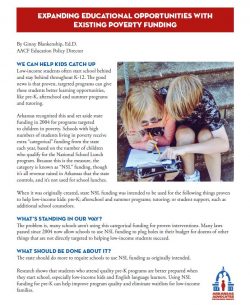
Students living in poverty face more obstacles to learning and need more resources to succeed in school. Extra funding for high-poverty schools in Arkansas was established in 2004 and was originally meant to finance three evidence-based approaches to help close achievement gaps: tutoring, afterschool and summer programs, and quality pre-K programs.
However, the potency of this effort has diminished over the years, as the funds have been spent on a wider range of programs that don’t necessarily target the students most in need.
In her handout, “Expanding Educational Opportunities with Existing Poverty Funding,” Ginny Blankenship, Arkansas Advocates for Children and Families education policy director, explores the original intent of the funds, what’s standing in the way of the funding from targeting students from low-income families, and what should be done to put the funding back on track.
Download a copy of the handout by clicking on it above.
